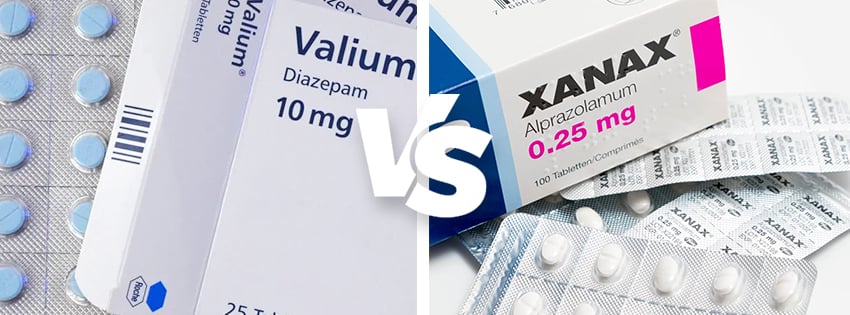
Diazepam vs XANAX – When anxiety hits like a freight train or sleep evades you night after night, chances are you’ve heard of Valium and Xanax—or their more clinical names: Diazepam and Alprazolam. But while they often get tossed into the same conversation, the two aren’t carbon copies. In fact, they differ in how they work, how long they last, and even how they’re prescribed. So let us discuss the topic of Diazepam Vs. Xanax
So, which is better? The answer isn’t as simple as one-size-fits-all. Let’s unpack this.

Both Diazepam and Xanax are benzodiazepines, a class of medications that work by enhancing the activity of GABA, a neurotransmitter in the brain. This results in a calming effect—hence their use in anxiety, panic disorders, muscle spasms, and even seizures.
| Feature | Diazepam (Valium) | Alprazolam (Xanax) |
| Onset | ~30–60 minutes | ~15–30 minutes |
| Duration | Long-acting (up to 24 hrs) | Short-acting (4–6 hrs) |
| Half-life | 20–70 hours | 11–16 hours |
| Addiction risk | Moderate | High (shorter-acting = faster ‘reward’) |
Diazepam tends to be the go-to for longer-term issues—like muscle spasms, alcohol withdrawal, and generalised anxiety. Because of its longer half-life, it sticks around in your system longer, which can help reduce the likelihood of withdrawal symptoms and makes it easier to taper.
Doctors often favour it when they want a steady, subtle effect without constant re-dosing.
According to the NHS, Diazepam is typically prescribed for:
Xanax, on the other hand, is fast and intense. It’s designed to calm panic attacks and severe anxiety right now. That makes it incredibly effective in acute situations—like unexpected panic episodes or flying phobia—but also more prone to misuse due to its quick onset and shorter lifespan in the body.
The issue? What goes up must come down. Xanax can wear off quickly, leading some users to feel the return of anxiety—or even rebound anxiety—faster than with longer-acting meds.
Per NICE UK guidelines, Alprazolam is not usually recommended for long-term anxiety in the UK because:
All benzos come with a risk of side effects, but how intense and how fast they hit can vary.
What’s concerning is that Xanax’s withdrawal can be more brutal, especially if someone’s been using it for a while. Diazepam’s slower metabolism often allows for smoother tapers under medical supervision.
Addiction and Withdrawal: A Major Talking Point
Let’s not sugarcoat it—both of these medications carry a risk of addiction. However, studies and clinical experience show that shorter-acting benzos like Xanax have a greater abuse potential. The rapid “relief” sensation can become something people chase.
That’s why Diazepam is often used as a step-down drug for those coming off short-acting benzos like Xanax. It gives a longer coverage window with fewer spikes and crashes.
UK Addiction Treatment Centre highlights that:
“Xanax is among the most addictive benzodiazepines available… withdrawal symptoms can be severe.”
Metabolism Matters: Why Half-Life Isn’t Just Science Talk
If you’re wondering why some people feel hungover the day after a Diazepam dose, it’s because the drug stays in the body for a long time. That’s a blessing and a curse: better for tapering, worse if you need a sharp mind the next day.
Xanax wears off quickly, but that can also lead to:
That depends entirely on the situation.
From a UK medical perspective, Diazepam is generally preferred, particularly because Xanax is not usually prescribed on the NHS due to its abuse potential.
Final Word
Both drugs can be lifesaving or life-altering—depending on how and why they’re used. But these aren’t casual tools. They require precision, guidance, and responsibility. The moment you cross from “managing symptoms” to “chasing feelings,” you’ve stepped into dangerous territory.
If you’re struggling with anxiety, it’s vital to look beyond pills and explore therapy, lifestyle changes, and support systems.
Medication is a bridge—not the destination.
References
NHS. Diazepam. https://www.nhs.uk/medicines/diazepam/
NICE. Generalised anxiety disorder and panic disorder in adults: management. https://www.nice.org.uk/guidance/cg113
UKAT. Xanax Detox. https://www.ukat.co.uk/detox/drug/prescription/benzodiazepine/xanax/
Published on: April 15, 2025
Last updated: January 17, 2026

